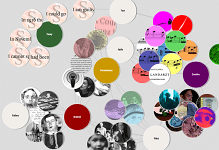Do Interactive Reading Projects Cope with Distraction Through Stimulation?

Perhaps more interesting to me is Sommers’s comparison of text to other media in the beginning, noting that text requires concentration while movies, music, and plays carry on whether you’re watching them or not (unless you hit pause).
A lot has been written about the impact the internet has had on our ability to concentrate – endlessly linking up previously distinct entities, it diverts our attention in a million different directions. There are two results: convenience, and an abundance of stuff. Industries from music to television and publishing are being comprehensively routed by the implications of this new distribution model, and audiences find it increasingly hard to concentrate on anything for very long at all.
She doesn’t really seem to do a good job of tying this to her discussion of the hypertext media projects, unless her contention is that we have to have the stimulation of being able to click on something to see something new to keep our attention on what we’re reading. If that’s the case, I can’t see that it bodes well for fiction reading in the future. Non-fiction lends itself a lot more readily to reading in shuffled order—facts are facts, regardless of which one you read before another one. Stories are less so.
Is this how reading is going to end? In an avalanche of distractions? Somehow, I doubt it. E-books, both self-published and traditional, are doing too well for reading to be in that much danger.
No Comments